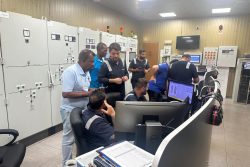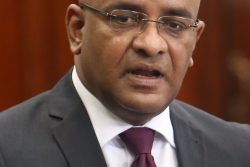Dear Editor,
The Guyana Trades Union Congress (GTUC) is a microcosm of the society of which the Working People’s Alliance (WPA), which Tacuma Ogunseye is a part of, has shared responsibility to defend. Reference is made to his letter “Tepid response from unions on gov’t failure to make budget allocations for public sector wages” (SN 16th February 2022).
Whereas Hubert Nathaniel Critchlow would be concerned with many things in society, he would be even more disappointed in how the society that he sought to build through the Trade Union Move-ment and political party, has lost direction. There are men of intellect and credentials that Critchlow was not, and yet in the 21st Century they are failing to achieve what he and the waterfront workers, who were not so credentialed, were able to fight for. In the time when Critchlow was fighting for the rights of colonised workers, one man, one vote and internal self-government, he had the support of Guyanese and political leaders like Cheddi Jagan and Forbes Burnham. The country was one on that. We had a national purpose and direction, and united in the quest for self-determination and nationhood.
And whereas Critchlow fought in an era against colonial masters, in this era it is their companies. We have political independence but are in economic bondage. With a 4th standard education, he stood up and fought a world-power colonial force to put Guyana on a pathway that led to internal self-governance and empowerment of the working class people. That opportunity to build on it and develop further is being squandered by men of so-called greater academic intellectual prowess and achievements. Critchlow would be disappointed with lots of things in the society today, the politically engineered fracturing in the trade union movement by a so-called working-class government.
Walter Rodney, who was portrayed as a working-class politician, would also be disappointed in what his party had done to the working class. After achieving the opportunity for executive power sharing, as part of A Partnership For National Unity & Alliance For Change (APNU+AFC), the WPA was assigned two critical ministries. These were the Ministry of Education and the Ministry of Public Service. These ministries failed to deliver for the teachers and public servants. For the period of the coalition government, the right to collective bargaining was denied where the government was the employer. When the Guyana Teachers Union announced they had an agreement with the Ministry, Minister Rupert Roopnaraine came out and announced that it was not an agreement but merely a discussion. One of the first tasks Minister of Public Service, Tabitha Sarabo-Halley, embarked on was the termination of workers. Whereas, it cannot be recalled Tacuma publicly speaking out to these transgressions, what could be said is that even if he did, it made no impact on the government.
The political leaders of today are different from Burnham, Jagan and Desmond Hoyte. They lack the calibre, vision and dynamism of earlier thinkers and leaders in society. They are driven by more selfishness as opposed to national good. In Critchlow’s time, it was one united group against external forces. Now we have a nation divided against itself, even on matters that are good for the people as a collective. For more than two decades, yours truly and the GTUC, were the only voices calling for meaning to be given to a new form of governance, as enshrined in Article 13 of the Constitution of Guyana. After workers fought under the political leadership of Desmond Hoyte, to change the structure and culture of governance to “inclusionary democracy,” rather than the powers that be realise enforcement through legislation, policies, and programmes, this most important article remains ignored.
GTUC’s position on the National Budget was explicitly articulated by Shadow Minister of Legal Affairs and Labour, Roysdale Forde, in his debate presentation in the National Assembly. This notwithstanding, should Tacuma be desirous of knowing the Congress’ position, I’d be happy to send him a copy upon request. Further, the GTUC remains steadfast that the right to collective bargaining must be the process in determining increased wages and salaries, and improved working conditions. The progressive thinkers and doers in society must not only be the trade union, it includes several other members in society. And whereas the GTUC shall determine its agenda, the organisation is willing to partner with others who are willing to work to alleviate the suffering of the working class and fight for Critchlow’s ideals. To this end where Tacuma is serious, and the WPA is serious and stands capable of effecting the changes necessary through renewed activism, the GTUC in the spirit of Critchlow, Jagan and Burnham, the forerunners for nation building and unified struggle, welcome them for discussions on the way forward.
Sincerely,
Lincoln Lewis





